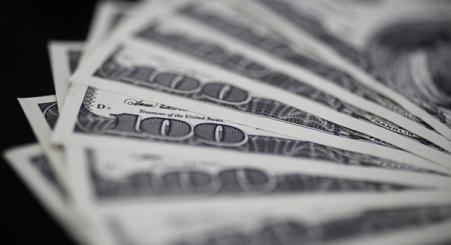By Jessica Menton -
The U.S. dollar is in its most potent position since before the Great Recession, but that may not be such a good thing for the still-recovering U.S. economy. The dollar hit a seven-year high against the Japanese yen on Monday, its highest level since July 2007, boosted by a surprisingly strong jobs report last week and following concerns that Japan's recession is deeper than expected.
"Generally speaking, with the U.S. exiting [the U.S. Federal Reserve’s quantitative easing efforts], we're now in a prolonged period of U.S. dollar strength,” Lennon Sweeting, a corporate dealer at USForex Inc., said A stronger dollar reinforces the view among economists that the U.S. central bank may hike interest rates by mid-2015 to stave off inflation.
To be sure, a stronger U.S. dollar has many advantages. One of the biggest pros for the economy: American companies and consumers pay lower prices for imported foreign goods.
"It will also help the government pay down its deficit with a stronger currency," Ken Willis, a senior corporate dealer with USForex Inc., said. The U.S. deficit is currently $483 billion, according to the U.S. Department of Treasury. A significant amount of debt is issued in foreign currencies to increase the attractiveness of the debt to foreign investors. Thus, a strong dollar allows a government to better service its debts, especially in a scenario where the debt was issued when the dollar was weaker, Willis said. The stronger dollar will aid the government in making more timely and efficient payments of debts to foreign creditors, which in turn helps to reduce national deficits.
The U.S. Dollar Index hit new highs last week following the bullish labor market report for November, pushing the greenback to an eight-year high. The index is the value of the greenback compared with a basket of six major foreign currencies that are significant trading partners, including the euro, the Japanese yen, the British pound, Canadian dollar, Swedish krona and the Swiss franc. The U.S. Dollar Index rose 1.237 percent last week, to 89.3, its highest level since April 2006.
A Stronger Dollar Hurts U.S. Manufacturing
But a more powerful dollar also has steep downsides for the U.S. economy. Chief among them, it makes American goods sold abroad more expensive. As the dollar strengthens, U.S. exports will be less competitive, which could weigh on the manufacturing sector, a big part of the U.S. economy as it accounted for 12.5 percent of gross domestic product last year, according to the Bureau of Economic Analysis.
Manufacturers contributed $2.08 trillion to the U.S. economy in 2013, up from $2.03 trillion in 2012. For every dollar spent in manufacturing, another $1.32 was added to the economy, the highest multiplier effect of any economic sector, the Bureau of Economic Analysis said in its Industry Economic Accounts report.
“That’s a concern. As the dollar continues to gain, there are concerns that other markets will come in that are a bit more competitive on the products that the U.S. is manufacturing and exporting right now,” Willis said.
Dollar Strength Weighs On Corporate Profits
A prolonged period of dollar strengthening would also hurt U.S. multinational corporations once they convert foreign revenue to dollars. That will slow earnings growth. Nearly 83 percent of Intel Corporation's sales, for instance, come from overseas while Qualcomm Inc.'s overseas sales account for 97 percent of its annual revenue. “Particularly during this time of the year, we often see a repatriation ahead of the end of the year and ahead of the holidays, because there’s usually quite a rush to give the U.S. dollar a boost,” Willis said.
Fewer Foreign Tourists
A stronger dollar could also have an impact on tourism in the U.S., reducing foreigners’ buying power. “It may cause them to look to less expensive options for their travel,” Willis said.
The euro has depreciated quite rapidly against the dollar over the past month, as $1 on Tuesday was worth 0.81 euro. Much of the recent depreciation has been in anticipation of an interest rate hike from the Federal Reserve in the U.S. next year, along with quantitative easing in Europe. Despite Europe's recent economic woes, the dollar’s strength is helping the competitiveness of countries such as Spain, Portugal and Italy.
“It’s definitely having some effect on the European economy that is positive. Together with lower oil prices, that definitely helps the prospect of growth for next year,” Bert Colijn, senior economist at The Conference Board, said.
Experts expect the U.S. dollar to remain strong well into 2015 and continue its gains against the Japanese yen. “That’s going to be a negative story for the yen. Overall, the yen, like the majority of the world’s major currencies, will suffer losses against the dollar throughout 2015,” Sweeting said.
